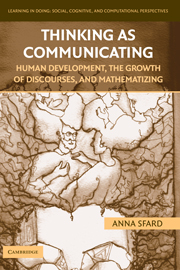Book contents
- Frontmatter
- Contents
- Series Foreword
- Introduction
- Acknowledgments
- Part I Discourse on Thinking
- Part II Mathematics as Discourse
- 5 Mathematics as a Form of Communication
- 6 Objects of Mathematical Discourse: What Mathematizing Is All About
- 7 Routines: How We Mathematize
- 8 Explorations, Deeds, and Rituals: What We Mathematize For
- 9 Looking Back and Ahead: Solving Old Quandaries and Facing New Ones
- Glossary of Commognition
- References
- Name Index
- Subject Index
- Titles in the series
9 - Looking Back and Ahead: Solving Old Quandaries and Facing New Ones
Published online by Cambridge University Press: 27 July 2009
- Frontmatter
- Contents
- Series Foreword
- Introduction
- Acknowledgments
- Part I Discourse on Thinking
- Part II Mathematics as Discourse
- 5 Mathematics as a Form of Communication
- 6 Objects of Mathematical Discourse: What Mathematizing Is All About
- 7 Routines: How We Mathematize
- 8 Explorations, Deeds, and Rituals: What We Mathematize For
- 9 Looking Back and Ahead: Solving Old Quandaries and Facing New Ones
- Glossary of Commognition
- References
- Name Index
- Subject Index
- Titles in the series
Summary
It is venturesome to think that a coordination of words (philosophies are nothing more than that) can resemble the universe very much. It is also venturesome to think that of all these illustrious coordinations, one of them – at least in an infinitesimal way – does not resemble the universe a bit more than the others.
Jorge Luis BorgesThe fact that Newton's vocabulary lets us predict the world more easily than Aristotle's does not mean that the world speaks Newtonian.
Richard RortyWe (the undivided divinity operating within us) have dreamt the world. We have dreamt it as firm, mysterious, visible, ubiquitous in space and durable in time; but in its architecture we have allowed tenuous and eternal crevices of unreason which tell us it is false.
Jorge Luis BorgesWe have come a long way since we first puzzled upon a bunch of persistent quandaries on human thinking. That early encounter led us to question the traditional acquisitionist discourse and resulted in the attempt to modify our thinking about thinking. It is now time to ask where we are at the end of this long journey. In this final chapter, after a brief summary of what has been done so far, I ponder about the implications of the shift to a commognitive outlook for research on human development and for educational practice. My first move, however, is to revisit the old quandaries, one by one, asking whether the change in our discourse has yielded the desired resolutions.
- Type
- Chapter
- Information
- Thinking as CommunicatingHuman Development, the Growth of Discourses, and Mathematizing, pp. 261 - 294Publisher: Cambridge University PressPrint publication year: 2008



